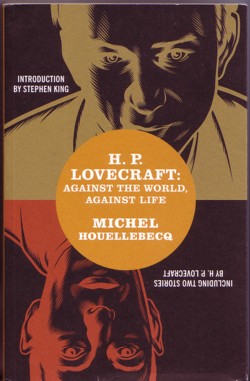H.P. Lovecraft: Against the World, Against Life
Originally for the Samhain 2005 mailing of the Esoteric Order of Dagon
 -->
-->Immediately upon reading the introduction, I was ready to put this book down and curse it’s very existence. I do wish that Steven King would pay more attention to what he is writing. He asserts in his introductory essay that Arkham House is defunct (p. 16 footnote 6), which might be more excusable if he did not in the very same essay attack "chickenshit academics". As a former English teacher, King should know that he needs to check his facts when writing an essay, especially a fact so easily confirmed or denied. At least the average ‘chickenshit academic’ knows that. And the less said about King’s perception of Cthulhu as "gigantic, tentacle-equipped, killer vagina from beyond space and time" (p. 13, footnote 3) the better. Beyond these blunders, King spends a great deal of time writing about himself, rather than Lovecraft, or even Houellebecq’s essay. All in all, not a great way to begin the book, but if the inclusion of King’s name got a few more people to pick up this book, then the publisher should well be happy.
Having moved into the essay proper in an annoyed mood, I came away with two major complaints. First that the translator is unable to find so many of the quotes Houellebecq attributes to Lovecraft. As with King above, there’s bloody little scholarly point in citing Lovecraft’s work if subsequent people cannot go look and verify those quotes for themselves. Never is this more apparent than when such quotes cannot be verified. Houellebecq makes some very interesting statements about Lovecraft’s life and uses some remarkable quotes to support his conclusions, but if those quotes are as specious, they do his argument no good.
Further, I must confess to some anger on finding that the essay takes up less than a hundred pages of a book that is more than two hundred pages. Certainly it’s nice to see ‘The Call of Cthulhu" and "The Whisperer in Darkness" in another book, are we who purchase the book likely to not have read these stories? I can’t say that I find this padding particularly palatable, although I do understand the publisher’s need to do so. These stories fatten the book, making it less of a risk. A two hundred page, fifteen dollar trade-sized paperback makes better economic one than a hundred pager.
Despite this, Houellebecq’s essay, for all it’s faults, is a marvelous analysis of Lovecraft. And although I do not agree wholly with Houellebecq’s conclusions, his essay is certainly though-provoking. The essay is well-reasoned, even ignoring the supporting quotes. My own conclusion is that Houellebecq has missed the mark, but only by a little. To my mind, Lovecraft was not against life so much as living in rejection of what life had brought him. His life was an iron assertion of the will of the individual over the circumstances into which he had been born. He rejecting his poverty, and taking the pose as a country gentleman from a previous century. Although he wrote, he would not insist and pursue when individuals owed him money for them. It is this, Lovecraft’s ability to desire to have a life and in fact live contrary to these facts, that make him such a fascinating person to study. And although he strays a little, Houellebecq is correct in this, that the dissonance between Lovecraft’s life and what Lovecraft thought life out to be like is the foundation for virtually all of Lovecraft’s work. And for that, his essay is definitely worth reading.